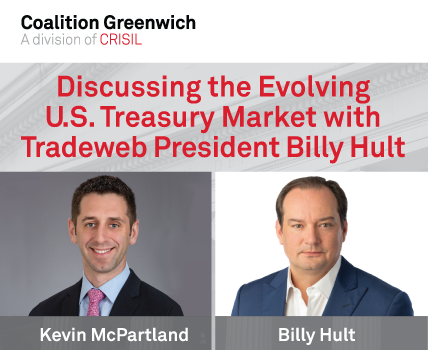Discussing The Evolving U.S. Treasury Market with Tradeweb President Billy Hult
Q4 2021

The COVID-19 pandemic may have sped up the electronification of the capital markets, but in no way does that mark the end of innovations in the marketplace. “In some ways, that’s when innovations start,” says Billy Hult, President of Tradeweb, in an in-person interview with Kevin McPartland, Coalition Greenwich Head of Research, Market Structure and Technology, from Tradeweb’s headquarters in New York.
Nowhere is this more evident than in the U.S. Treasury market, the marketplace where Tradeweb got its start in 1998 and where it has now set the stage for further evolution with its acquisition of Nasdaq Fixed Income (formerly known as eSpeed).
“We always felt government bonds was one of the most important markets in the world. All these years later, we're still seeing really cool and interesting innovations here,” says Billy Hult.
The ground is ripe for innovation because electronic trading (e-trading) has evolved and “become mainstream from a consciousness perspective,” he feels.
E-trading volumes have expanded sharply, especially post-pandemic. Besides, the past two years have belied “the fear that as markets moved more electronic, it would be more and more difficult for banks to make money,” says the Tradeweb President.
“To be able to see such profitability as these markets continue to move electronic is really good for the business overall.”
Buy Side Innovation
Even better, the level of sophistication, particularly on the buy side, has changed dramatically. Says Billy Hult, “The way the buy side is finding liquidity, the way they're knowing who and which dealer to ask and when, how to break up large trades into smaller trades, how to understand that dynamic in a much more sophisticated way is one of the more important evolutions over the last couple of years.”
The rise of non-bank liquidity providers has played a big role in this, he believes. “What firms like Citadel Securities have been able to do in making their market-making business more mainstream and relevant in fixed income has been very impressive. I think there'll be more to follow,” he says.
The Nasdaq Fixed Income Acquisition
In fact, Tradeweb’s connectivity with such firms means that it is in a good position to play the opportunity in the government bond market around the central limit order book—an opportunity that prompted it to acquire Nasdaq Fixed Income this February.
So, how has Tradeweb integrated its existing direct-to-stream Dealerweb platform with Nasdaq Fixed Income? “We are presenting them side-by-side. We feel these businesses are complementary. In a more volatile marketplace, we like having the order book business. And in a quieter market, there's something very strong about how the streaming business works. The two-pronged approach has worked well for us.”
Billy Hult expects the overlap between Tradeweb’s traditional request-for-quote business and the central order book world to increase, going forward. “We’re going to continue to evolve with the marketplace. Market structure changes, and it can change very quickly. From our perspective, we never want to be caught on the wrong side of change. So, it's always like, ‘Do we have enough tools to be able to apply them at the right time and make it all work?’” he asks.
That includes grabbing the first-mover advantage in emerging markets such as China, where Tradeweb has built the first offshore platform offering electronic access to the China interbank bond market. “It’s a huge opportunity. It's never going to be straight-line success but we wanted to be positioned first,” says Billy Hult.
An Experience Business
Naturally, deploying cutting-edge technology will continue to be critical, especially as e-trading is not just about making the trade but equally about delivering the entire workflow. Until recently, he says, he would have agreed that government bond trading is still a relationship business. Not so today.
“I would say it's an experience business. Part of the experience is around the technology and price, and being able to deliver all those things in a clean and credible way. Another part of the experience may be around the relationship component. But I don’t think calling it a purely relationship business perfectly characterizes how important that evolution has been, particularly over the last two years.”
Going forward, Billy Hult expects artificial-intelligence-based automated trading to impact the market in a bigger way. “It went from the phone to the mouse and now, it’s onto algorithms. That’s here to stay,” he says. As for inflation and central bank tapering, “There is a strong feeling that as the market moves into a different direction, off-the-run volumes will pick up.”

